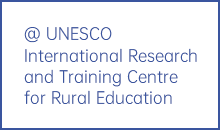The fourth episode of the "Futures of Education and Education for Rural Revitalization" dialogue series organised by the UNESCO International Rural Education Research and Training Centre (UNESCO INRULED) was successfully held on the evening of 17 December 2021. The theme of this dialogue is The Provision and Retention of Qualified Rural Teachers: Governmental Responsibility or Social Contract?. This dialogue was conducted both online and offline with experts around the globe, and it launched an in-depth discussion on the challenges and future practices on the provision and retention of rural qualified teachers. The content of the dialogue is closely related to the UNESCO Futures of Education initiative report on building a new social contract for education. Six experts from three countries in Asia, Europe and Africa discussed the support provided by the government and social forces on the provision and retention of rural teachers under different governance backgrounds and policy systems, the role of individual teachers in different social and cultural backgrounds, and future policy and practical pathways.
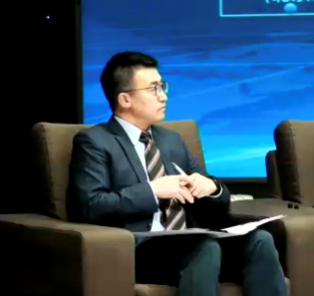
Professor Sang Guoyuan, Beijing Normal University, Moderator of the Dialogue
Professor Sang Guoyuan, Chief Expert of UNESCO INRULED, presided over this dialogue. Professor Sang first introduced the theme of this event, the concept of rural teachers, provision, and retention. Professor Sang mentioned that some researchers divided the provision of teachers into seven stages: attracting candidates, admission to teacher training programmes, pre-service training, job placement for graduates, providing good working conditions, providing on-the-job training, and providing teacher retention and resignation. Then, Professor Sang raised the main theme of this dialogue and invited experts and scholars to discuss the challenges faced by rural teachers around the world, government-level policy support, social forces and contributions, individual teachers' roles, and policy recommendations.
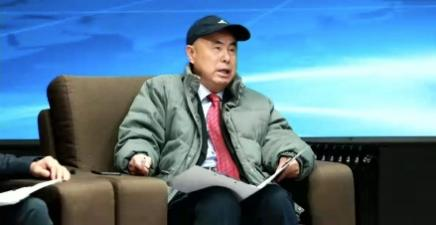
Professor Teng Xing, Minzu University of China
Professor Teng Xing from Minzu University of China expressed his views on teacher provision reforms and the challenges faced by the provision and retention of the status quo of the rural teacher team. "The Push and Pull Theory can explain why rural teachers are willing to move to cities and developed areas. Because they were hoping for well-paid jobs, this is in terms of economic benefits. In addition, there are some pushes and pulls in folk culture. If we want to solve the problem of rural teacher migration on the provision reform, we must study what are the push-pull factors of rural teachers’ migration."
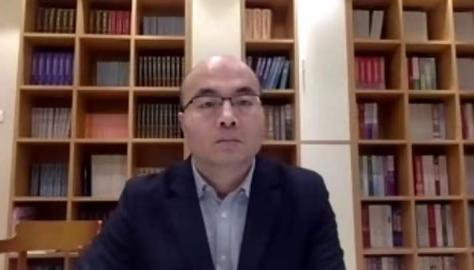
Professor Qin Yuyou, Northeast Normal University
Rural teachers in different countries are facing many problems and challenges. What specific measures has the government provided? In response to this problem, Professor Qin Yuyou from Northeast Normal University pointed out that "Since 2006, the central government of the People’s Republic of China has launched the Special Post Teacher Plan, and it has been implemented until now. Also, 2015 Rural Teacher Support Program has brought refreshing energy and corresponding material foundation into the construction of the rural teacher team. These series of policies are all aiming at solving the problems faced by rural teachers."
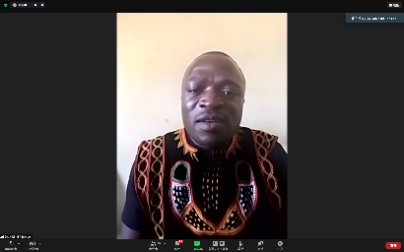
Dr. Kibinkiri Eric Len, The University of Bamenda, Cameroon
Dr. Kibinkiri Eric Len from the University of Bamenda in Cameroon also shared Cameroon’s experience: “Now the overall income of teachers is not satisfactory, and very few students are willing to attend the teachers’ college. The Cameroonian government is making every effort to change this situation. The government has adopted some national-level policies to strengthen teacher training, certain budgets are allocated on teachers training every year".

Professor Li Jinyu of Northwest Normal University
In recent years, many educational non-profit organizations, international organizations and other social organizations have gradually participated in the process of teacher training. Professor Li Jinyu of Northwest Normal University believes that this is a topic worthy of discussion. The idea of social contract is in line with the problem of rural teachers in China. He said, “Non-profit organizations are not just a supplementary effort, but have more important impacts, such as their roles in promoting the development of rural teachers, participatory teacher training, and cooperative learning in the classrooms. These projects are gradually implemented in rural schools and are becoming a pattern and idea recognized by many rural teachers.
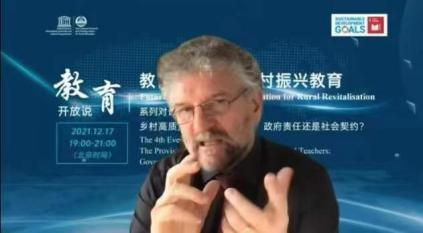
Professor Martin Valcke, Ghent University, Belgium
Professor Martin Valcke from Ghent University in Belgium said that in Western Europe, teachers are facing many difficulties, including short contract periods, unstable positions, frequent replacement of junior teachers’ classrooms, schools and courses, and great diversity in student groups (mainly in languages and cultures). Professor Martin Valcke believes that to retain teachers from the perspective of individual teachers, in addition to improving teacher contract arrangements, it is necessary to provide teachers with professional training in school to solve the above-mentioned challenges encountered by frontline teachers. At the same time, Professor Martin Valcke mentioned that the Netherlands, Germany, Belgium and other countries are advocating for the promotion of the concept of teacher groups, organising joint teaching and cooperative teaching and research, and encouraging teachers to collaborate to solve problems. This practice has also been proven to improve teachers’ mental health and help with the retention of teachers.
The experts then put forward policy suggestions and expectations on the provision and retention of rural teachers in the future and interacted with about 3,000 viewers in the ZOOM virtual meeting room and the Bilibili stream room to answer questions. Professor Li Jinyu of Northwest Normal University stated that attracting outstanding students to become rural teachers is a basic problem that deserves to be solved in terms of understanding, systems, and policies. Based on the original “Policy in 9 Words” — “Willing to go. Willing to stay. Be better teachers.”, he put forward the new “Expectation in 15 Words”: “Willing to go. Willing to stay. Be great teachers. With high mobility. With promising developments.” At the end of the dialogue, the moderator, Professor Sang Guoyuan, thanked all the guests for their participation and said that rural teachers are the children’s “lamplighters”. They are like a torch of hope, bringing light and the future to children in the countryside. Professor Sang looks forward to inviting more experts with the support of the UNESCO INRULED to discuss the development of rural teachers and the valuable experience of rural teachers.
As the provider of learning and key quality assurance agent, teachers are indispensable in any educational topic. In the latest report Reimagining our futures together: a new social contract for education, UNESCO emphasised the professional role of teachers and called for the reconstruction of teachers as knowledge producers, collaborators, researchers, and social participants. Therefore, the discussion on the provision and retention of rural teachers from the perspectives of both government responsibility and social contract is an important prerequisite for ensuring the development of teachers in the future education blueprint. At the same time, UNESCO INRULED organises dialogues among experts around the world, in the spirit of reimagining the future social contract, and is committed to involving everyone in the public discussion of key educational issues and to establishing an open global platform for sustainable development that is capable of breaking barriers.
Please check the following link to rewatch the dialogue: https://www.youtube.com/watch?v=vbmOAuWmkxQ
Next week, UNESCO INRULED will release the content review and video of this event on the official website. Please stay tuned for more information.










